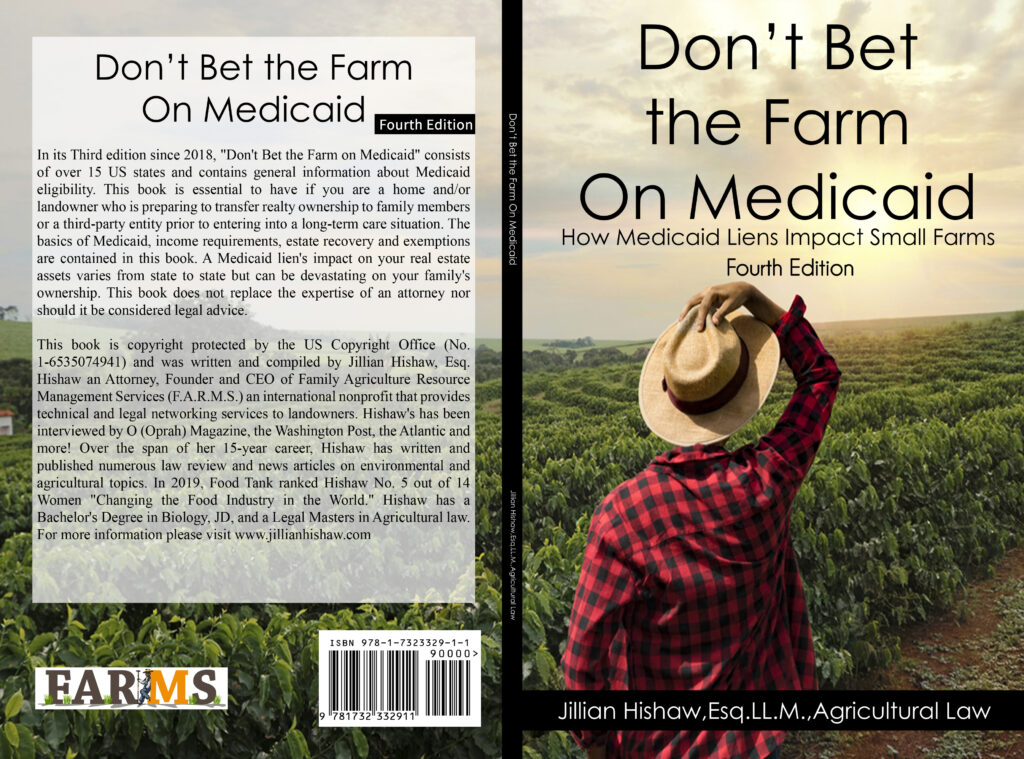By David Jordan Jr
One of the greatest tragedies in not only U.S. history, but also world history is the theft of land. There have been many people and families globally that have fallen victim to the loss of land. Whether it has been through misinformation, laws and regulations implemented into states, cities and countries or falsified documentation, there has been a continuation of property being removed from its owners. Enter Agricultural Attorney Jillian Hishaw. Hishaw holds a bachelor’s degree in biology from Tuskegee University and a Juris Doctorate and Legal Master’s in agricultural law, from the University of Arkansas-Fayetteville Law school.
Her first-hand experience of witnessing her family lose land inspired her journey that has led her to help farmers and land owners all over the world. Understanding the importance of information and legal structure, she has embraced her calling to help restore righteousness in the world of agriculture through her career. In addition to being an Agricultural Attorney, Hishaw is an award-winning author, having written six informative books for landowners and farmers.
The year 2023 marks the 10th anniversary of F.A.R.M.S., being in operation. Family Agriculture Resource Management Services (F.A.R.M.S.) is the non-profit Hishaw is Founder and Director of located in North Carolina. F.A.R.M.S., provides legal and hunger relief support in and outside the US.
Hishaw talked to ESHE about her career and how she is has been able to impact the lives of farmers and land-owners on a global level.
David Jordan Jr: Through out not only the history of the United States, but world history, the relevancy of land and property to human existence has coincided forever. Many wars both nationally and internationally have stemmed from land, the value of land and the use of land. What inspired you to become an agriculture attorney?
Jillian Hishaw: Theft of my family’s farm due to a dishonest lawyer’s actions hired by elders in my family led to the loss of our family land that was known to have mineral deposits i.e. oil on the property inspired my career in agriculture. “Killers of the Flower Moon,” resonates with my book “Systematic Land Theft,” which took 14-years to complete and tells the history of my family land loss experience in more depth along with the Creek Tribal Nation that owned my great-great grandmother and an enslaved person.
David Jordan Jr: What is the biggest misconception you face about your work?
Jillian Hishaw: People think I am not the attorney. First, I am not an attorney. I have been referred to as the secretary, paralegal, but I am the ATTORNEY that is saving land in multiple countries for two decades. The second misconception is I only help Black farmers. I have helped Hispanic ranchers for four years win a recent water case, amongst farmers in Minnesota, Tribal farmers via Pee Dee Nation, White farmers who have been key to advocating for Black clients when I could not help and more. The reality is many of my cases are Black, White, and Asian individuals trying to take Black owned land. What they want is the land and mineral rights. I try my best to stop such actions no matter what color the thief is. Lastly, another misconception people believe is that my books and experience are not being used in entertainment, it is being used unfortunately often without my consent and paid permission.
David Jordan Jr: Many black farmers in the United States of America have been victims of systematic land theft. Do you find some areas of the country to have more land theft than others? Does the current use of land influence land theft?
Jillian Hishaw: No, the entire 1.9 billion of usable acres that make up the United States were stolen. However, when it comes to certain sections of the U.S. it was stolen in mass misappropriation three times over in the Southeast section of the states or better known as the Black Belt region of the country that consist of 13 states from VA to Texas. When I state three times over, the land was first stolen from Tribal Nations; second, Black landowners during Reconstruction and third, the US Department of Agriculture (USDA). In the early 1900’s Blacks owned upward to 19 million acres now less than 1-2 million acres are left. The reality is we lose 30,000 acres per year in the Black community due to predatory lending practices primarily led by the USDA. Over 90 percent of Black owned land have been loss. The USDA Annual Five-Year Census numbers the analyze percentage ownership based on demographic groups now include city gardeners to prop up the reality that out of all the demographics Black landowners lost the most land between 2012 to 2017. The reality is garden plots in major cities does not equate to the land and mineral rights that are being stolen at a rapid rate. Garden plots cannot replace the generational land we are losing. In addition, on average in the U.S., 175 acres of land are being loss per hour due to “development.” I don’t find paving over acres which grow the majority of our food in this country positive development. The problem is the importance of protecting rural acres and town is of no priority in this country anymore which contributes to rising food costs.
David Jordan Jr: As you have conducted a massive amount of research as an agricultural lawyer to be knowledgeable about the rights for farmers, has there been a significant change in laws and regulations on a national level for property owners or is each state in the U.S. different?
Jillian Hishaw: Currently, I am moving into my third year of litigation against the Department of Justice, USDA, three banking associations which consist of the American Bankers Association, the National Rural Lenders Association, the Independent Community Bankers Association, Robertson County, TN Sheriff and a Kentucky lawyer.
Self-funding the litigation has been a challenge, but it has led to half of my plaintiffs receiving debt relief which prior to my litigation many had liens on their land for years or lost land but not the debt. One of the issues in my pending two cases is even when USDA forecloses on Black farmers and their land is sold, USDA keeps the full loan amount on the farmers as if the land was never sold. When your home, land or even car is foreclosed or repossessed, the property is usually sold, and you as the former owner are left to pay off the difference from the sale. The problem is USDA is not eliminating the total debt amount, not reducing it down to the difference. Additionally, the federal legislature has noticed the disparities in treatment when it comes to Black farmers and tried to resolve some of the civil rights issues in the 2008 Farm Bill and most recently in 2021 American Rescue Plan Act (ARPA). Unfortunately, without oversight USDA implements the laws in a discriminatory manner. Once the Act was passed, a month later the beginning of twelve federal lawsuits were filed by White farmers halting the implementation of the Section 1005 and 1006 that would have provided a total of nearly $5 billion in debt relief and civil rights settlement aid to black and brown farmers.
However, due to the Wynn and Miller rulings, injunctions were approved by federal courts to halt the program and USDA repealed section 1005 opening the program up to all farmers including White farmers. The fund is open to all farmers. The issue that they are not promoting is the fact when Black farmers sign these claim forms in the hopes of receiving money from past discrimination they are really signing away their due process. The reality is three companies were given millions of dollars by USDA to process and settle past civil rights complaints which is illegal. Violating their own federal laws, all civil rights complaints filed with the USDA are supposed to be processed within 180-days. As a former USDA Adjudicator that worked in the Office of Civil Rights, once a farmer or employee files a civil rights complaint, a final agency decision must be issued which is what I use to draft as an attorney while working for USDA. Once issued, the final agency decision is supposed to be provided to the farmer, if the farmers decide to appeal, he or she are allowed an administrative hearing. If they are not happy with the decision, they are then allowed to file a complaint in federal court. The problem is Black farmers are never given a final agency decision let alone an administrative hearing preventing them from filing a case in federal court. Due to this strategy farmers have died waiting for justice like one of my clients Eddie Wise or now what is known as the estate of Eddie Wise. Under the present Section of 22006 and Sections 22007 of the Inflation Reduction Act, the three companies that were hired are acting like the judge and jury regarding past civil rights complaints and are doing so by eliminating the farmer’s rights off to an agency decision, administrative hearing and right to file a case in federal court. For example, I know of one farmer who submitted their claim and within an hour their claim was rejected. The only thing the farmer received was a guaranteed denial of future appeals rights.
David Jordan Jr: There have been many instances of farmers and property owners being misled and provided false information in attempts to obtain their land. What are some of the most common tactics used to obtain land that is illegal, but may not be common knowledge to landowners?
Jillian Hishaw: The fact is when you are a farmer of color specifically, a Black farmer you are more likely to be foreclosed on by USDA than any other demographic. According to the Stuckey Report, between 2006 to 2016, Black farmers were foreclosed on at a rate of 13 percent the highest rate out of all demographics. Comparatively, we own nearly the least amount of land next to Asian farmers. The reality is Black farmers, farm loan applications are rejected twice as much as other demographics and are required to overcollateralized when securing USDA lending. Due to this when farmers go to apply for operating capital from the Farm Service Agency which is the lending arm of USDA, they often do not qualify because they have no collateral to post on the loan. The average farmer needs operating capital at least twice per year to plant Spring and Fall crops. For Black farmers, if the lending is approved, its approved only at a partial amount and disbursed late, well after the planting season. For example, most Spring crops are planted in April and the average farmer will apply for Spring lending in January or February. However, for example, if you are a Black farmer and you apply for $100,000 you often receive $50,000 and it is disbursed in June instead of in March when needed to buy the seed to plant the crops, decreasing the farmer’s yields. At times when the check is finally cut and given to the Black farmer is it under the condition of a two-signature requirement. Meaning for a Black man to make a withdrawal from his account he must wait on a White male FSA loan officer to accompany him to the bank to make the withdrawal. The reality is Black farmers are made to be a spectacle in these farm loan offices, in waiting all day for the loan officers “schedule to be free” to accompany the farmer to the bank. Then being made to come back the next day after waiting hours because the loan officer was not available. This is the reality of many Black and Hispanic farm clients of mine when it comes to USDA.
David Jordan Jr: You’ve authored several books to increase knowledge amongst farmers and land owners. The book “Farm Tax Credits for All 50 U.S. States” provides in valuable information about tax credits available for farmers across the United States. When did these tax credits become available and how do the help farmers navigate their business in the farming industry?
Jillian Hishaw: Farm Tax Credit programs have been around for several decades, these programs have allowed rural landowners to reduce their property taxes in agricultural zoned rural communities up to 50 to 60 percent in some states which were created to conserve U.S. farmland/food producing acres. The challenge is farmers who reside in states like California or counties like Beaufort County, South Carolina are being taxed off their land. Since F.A.R.M.S., has helped farmers for years in both California and Beaufort County, SC or better known as Hilton Head, South Carolina pay their property tax to avoid a tax lien, we have seen major increases in property tax rates over the past two-years.
Forcing many landowners off their land due to land development and tax increases. Both the Farm Tax Credit book and “Don’t Bet the Farm on Medicaid” which outlines exemptions and estate planning tactics one can use to avoid a nursing home lien has saved many homes and landowners from losing their property over the past six years since I started publishing my first book back in 2018. Now, I have four books that many homeowners use in the cities and landowners utilize in rural areas as resource books to protect their property. “Don’t Bet the Farm on Medicaid” “Farm Tax Credits for All 50 U.S. States,” “Systematic Land Theft,” and “50 State U.S. Flags and their Historic Symbolism to Slavery.” In particular, “Systematic Land Theft,” took me 14-years to write and documents the legal land theft history in the US and parts of Africa. The book goes into depth about ways Tribal Nations stole land, how the Five Civilized Tribes which owned enslaved Africans like my great-great grandmother were forced to sell their land to the federal government for below market prices in the 1800s and dragged enslaved Africans along the Trail of Tears to settle in Indian Territory and now what is known as the state of Oklahoma and parts of Kansas, Missouri, Arkansas and more. Each chapter has a case study and interviews of Black farmers and pioneers like Ms. Marylin Vann, who is the only Black women to sue the Cherokee Nation for denying Black Freedmen or former enslaved their tribal rights. Ms. Vann won her case and tribal rights were restored for Black Cherokee Freedmen but for tribes like the Creek Nation of Oklahoma who owned my great-great grandmother, they have denied Black Freedmen tribal rights since 1979, thereby not having to share the settlement funding from all the Treaty settlement cases with the Black individuals they formerly owned.
David Jordan Jr: What is the best piece of advice you have ever received in your life that continues to propel you in your life journey as an agricultural lawyer?
Jillian Hishaw: Proverbs 3:5-6 “Trust in the Lord with all thy heart and lend not unto thy own understanding but in all thy ways acknowledge him and he shall direct thy path.” I have tried moving in a different direction in my career at times, but the path of civil rights and property protection always comes back as the sole focus of my career. So, I stay on the path that God has chosen for me in a relentless manner. Due to this focus, through F.A.R.M.S., and Hishaw Law LLC, my law practice I have purchased and donated over 2.5 million pounds of produce in six different countries (US, Haiti, Jamaica, Barbados, Arima, Trinidad, India, and Sierra Leone), saved over 10 million of Black and Hispanic in farmland assets and have provided over 400 farmers with $500,000 in emergency aid in medical and natural disaster crises over the past 20 years of my career.
*This Interview Is Dedicated To Jillian’s Brother Brian Hishaw*
Connect With Jillian Hishaw Below
Website: www.jillianhishaw.com
Law Website: www.Hishawlaw.com
Email: info@jillianhishaw.com
Linkedin: https://www.linkedin.com/in/jillianhishaw/
TikTok: https://www.tiktok.com/@attorneyjillianhishaw
Support 30000 Acres Here: www.30000acres.org
Facebook: https://www.facebook.com/jillianhishawfarms
Instagram: https://www.instagram.com/hishaw_lawllc/








